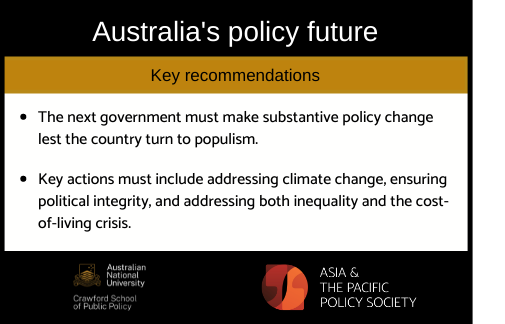
Photo by Letizia Bordoni on Unsplash
Voting in the public interest
Facing a cost-of-living crisis and a changing climate, Australians have their chance this election to make their votes count and to avoid cheap populist platitudes, Quentin Grafton writes.
Back in 2014, former Australian Prime Minister John Howard said, “I think the Australian people normally get their politics right.” His implication, surely, is that voters – at least as a group – make choices that support the national interest.
Fast forward to 2022. Australians must be equally discerning about who they vote for this election if they truly want their parliamentarians to put the national interest first.
There are three reasons why voters may not be as discerning as they need to be.
First, some continue to vote along party lines, regardless of performance, because of family history or long-standing loyalties. While ‘bolted on’ lifelong support for major parties has been gradually declining for decades, 62 per cent of surveyed voters in The Australian National University’s Australian Election Study 2019 identified themselves as a ‘partisan’ of one of the two major parties.
Second, voters can be misled. Few would deny there are liars and incompetents in politics who claim they will do things, but fail to deliver or do something else instead. Unfortunately, this means it is possible to cast a ballot for a candidate who then breaks their promises.
 Third, rather than voting ‘for’ a particular party or set of policies, it may be tempting to vote ‘against’ what voters do not want. This might be against the status quo if it is not delivering for them, sometimes with less regard for whom they that vote is cast.
Third, rather than voting ‘for’ a particular party or set of policies, it may be tempting to vote ‘against’ what voters do not want. This might be against the status quo if it is not delivering for them, sometimes with less regard for whom they that vote is cast.
With an increasing proportion of the population feeling disenfranchised, disconnected, and disadvantaged under the existing political and economic system, candidates can take advantage of these voting trends. Such populists run against the ‘system’ or ‘elites’ and frequently scapegoat particular communities or issues to establish their credentials and authenticity.
Former United States President Donald Trump’s successful 2016 campaign arguably ran as much against what he called the ‘swamp’ as it did against his Democratic opponent, former Secretary of State Hillary Clinton.
Similarly, the 2022 French Presidential election was won by the incumbent Emmanuel Macron, but 41 per cent of French voters still voted for the far-right populist alternative Marine Le Pen. As Trump claimed to be, Le Pen espouses herself as anti-establishment, and is strongly anti-immigration.
At the 2016 Brexit referendum, the leaders of the Leave campaign also portrayed themselves as anti-establishment – which they lumped in with being anti-Europe. Some key Brexiteers also scapegoated immigration as a key reason for Britain’s ills.
These Brexiteers rose a wave of discontent by millions of Britons who wanted a change to ‘business (and politics) as usual’ that was not delivering for them. Unfortunately, Brexit has yet to lift their economic fortunes.
As in the United States, France, and the United Kingdom, in the past few past decades, some Australians have experienced stagnating wages and there is growing wealth inequality.
Australia’s progressive tax and transfer system helps, but some households are doing it tough. Unsurprisingly, some voters are not happy with the status quo, and have put their votes towards populist alternatives at the ballot box. Avowedly populist political parties – Pauline Hanson’s One Nation and the United Australia Party – recorded 6.5 per cent of the popular vote, or over 900,000 votes between them, in the 2019 federal election.
Not all discontent leads to populist voting. Dissatisfaction, including within the Liberal Party, may make the 2022 election a watershed moment if a slew of independent candidates, running for office without affiliation to any political party, are elected. Among these independents are so-called ‘teal candidates’, prominent women who have had successful careers, benefit from strong local support, and have received funding from Climate 200.
The teal independents all share a common goal of greater action on climate change mitigation, political accountability, and a federal integrity commission to investigate corrupt practices.
Early signs show that this is a popular platform. Australians want an integrity commission, and an incoming government may provide it. Such a commission was promised by all major parties in the 2019 federal election but it has not been delivered by the Coalition government, and it’s not one of the Coalition’s 2022 federal election commitments.
The Greens, as well as the teal independents, are running on the number one issue for 29 per cent of Australian voters, action on climate change.
Their concern is that Australia is not doing enough on climate change mitigation, as highlighted by its rank of 59th out of 64 countries in performance on climate action in the Climate Change Performance Index.
The science shows that any incoming government must act decisively on climate change. In the Federal Budget Paper Strategy and Outlook 2022-23, a 359-page document that includes multiple economic and financial forecasts to 2025-26, climate change was only mentioned once – in a footnote.
In addition to climate change action, an Indigenous Voice to Parliament and overcoming disadvantage for many Indigenous Australians, a rising cost of living, a housing and rental crisis, underemployment, and an increasing wealth divide between older and younger Australians all need an effective response.
An incoming federal government will also need to do a better job at preparing for future disasters, to avoid repeating the tragic outcomes of the 2019-20 Black Summer bushfires or the 2022 flooding in northern New South Wales and southern Queensland. Both of these disasters disproportionately affected already disadvantaged communities.
Australia’s problems – from climate change to the pandemic – demand competent governments that accept their responsibilities, use the best available evidence to respond, and apply the resources at their disposal to effectively act in the public interest. To achieve this outcome, all voters will need to be discerning as to what is in the public interest when they get to the ballot box.
This piece was originally published as part of Policy Forum’s new feature section – In Focus: Australia’s policy future – which brings you policy analysis and ideas that go beyond the sound bites.
Updated: 1 July 2024/Responsible Officer: Crawford Engagement/Page Contact: CAP Web Team













